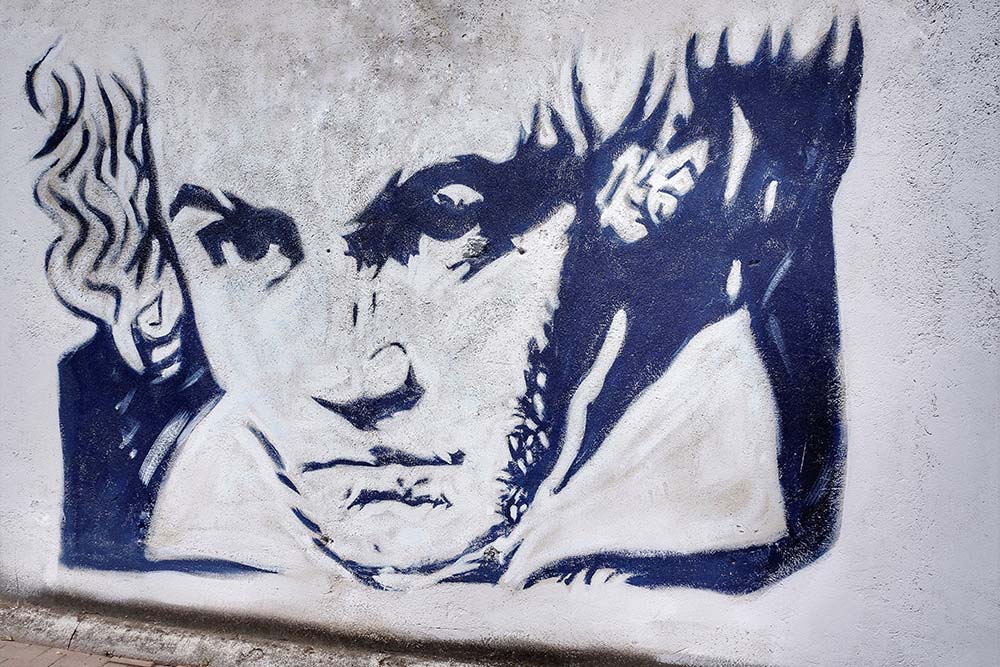
Street art of Ludwig von Beethoven (Pixabay/Richard Mcall)
At Commonweal, Nicholas Cafardi argues for the inclusion of lay input in the selection of bishops. When you read the McCarrick report, it is hard not to agree with Cafardi that the current system doesn't work. But be careful what you wish for? I fear the influence of wealthy and conservative lay leaders would increase if Cafardi's proposals were enacted. Perhaps in countries where religion is less polarized, it could work, but in the U.S.? I'll take my chances with the nuncio over the Knights of Columbus.
This story will not be news to regular readers of NCR, but NPR looks at the Trump administration's clash with the Catholic Church on the subject of death penalty, and especially at the prominent role one Catholic, Attorney General William Barr, has played in the recent spate of executions. I confess, I find it inexplicably chilling, as if they get some kind of thrill from this bloodlust.
At Politico, a look at how Donald Trump won one of the most racially diverse counties in the country, and won it by a lot: Robeson County in North Carolina, which is 42% Native American, 31% white and 24% Black, but mostly working class. Relatedly, at The Washington Post, Fred Hiatt talks with U.S. Rep. Antonio Delgado, the Black Democrat who represents an upstate, overwhelmingly white district where voters reelected Delgado while also voting for Donald Trump. How many times do we have to say it: Demography is not destiny, and while no one can discount the influence of race on our politics, those who look at America primarily through a racial lens will always misunderstand the possibilities of our politics. Until we end partisan redistricting, however, there will never be enough congresspeople like Delgado to get anything done, and if people loathe the status quo because of its dysfunction, you end up with Trump.
In The New York Times, law professor Tim Wu argues that the republic was saved from Donald Trump's authoritarianism not by the system of checks and balances written into the Constitution:
Instead, the president's worst impulses were neutralized by three pillars of the unwritten constitution. The first is the customary separation between the president and federal criminal prosecution (even though the Department of Justice is part of the executive branch). The second is the traditional political neutrality of the military (even though the president is the commander in chief of the armed forces). The third is the personal integrity of state elections officials.
It was the willingness of prosecutors, generals and state election officials to act virtuously, or at least professionally, that kept Trump's depredations within limits. Men may not be angels, as James Madison noted, but we will always need at least some people in positions of authority to behave like decent human beings.
Advertisement
Also at the Times, a look at China's authoritarianism and how Communist Party leaders fancy themselves superior to democracy because of the decisiveness and direction they can provide to their system. We will see about that. The one thing history teaches us about authoritarianism is that it is almost never benign.
At The Atlantic, Adam Serwer looks at the Trumpites who continue to claim the election was fraudulent, even though they know it wasn't, and the role that race does play in their evil worldview. His conclusion rings true and is profoundly disturbing:
The Republican base's fundamental belief, the one that Trump used to win them over in the first place, the one that ties the election conspiracy theory to birtherism and to Trump's sneering attack on the Squad's citizenship, is that Democratic victories do not count, because Democratic voters are not truly American. It's no accident that the Trump campaign's claims have focused almost entirely on jurisdictions with high Black populations.
Serwer expresses his surprise that there has not been more violence. Let's not give anyone ideas.
Doug Emhoff, the husband of Vice President-elect Kamala Harris, is going to be teaching at Georgetown Law School in the spring, according to The National Law Journal. Jill Biden, the next first lady, also plans to continue teaching at Northern Virginia Community College, as she did when her husband was vice president. This is the first time ever that both the first lady and the second dude will have day jobs.
At Smithsonian magazine, Isis Davis-Marks reports on the beginning of restoration work on the great organ from the Cathedral of Notre Dame in Paris. Like much of the structure, the organ was exposed to toxic lead from the burning roof, all of which must be carefully removed. Most of the pipes have been brought to a warehouse for cleaning. This kind of extensive restoration will, in effect, end up creating a new instrument, but hopefully it will possess the warm, rich sounds of the organ music lovers have enjoyed through the centuries.
To mark the 250th anniversary of the birth of Ludwig von Beethoven, Kyle MacDonald at ClassicFM compiles a list of 10 compositions by the master "that altered everything forever." It is a bit of a stretch, but only a bit.








